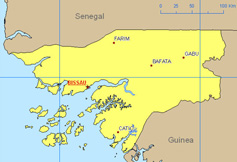The EU sets out roadmap for the gradual resumption of development cooperation with Guinea-Bissau

The EU Council today concluded consultations held under Article 96 of the Cotonou Agreement with the Republic of Guinea-Bissau and set out a roadmap to gradually resume development cooperation with the country (doc. 12515/11 ![]() ). The roadmap foresees that advances made by Guinea-Bissau in the reform process will be reflected in a gradual resumption of EU development assistance.
). The roadmap foresees that advances made by Guinea-Bissau in the reform process will be reflected in a gradual resumption of EU development assistance.
The EU considered the military mutiny of 1 April 2010 and the subsequent appointment of its main instigators to leading posts in the military hierarchy as a serious and evident breach of the essential elements of the Cotonou Agreement. In accordance with Article 96 of the Agreement, the EU therefore provisionally suspended parts of its development cooperation with Guinea-Bissau and engaged in political consultations that took place in Brussels on 29 March 2011.
At that meeting, Guinea-Bissau authorities put forward a series of undertakings in order to progressively ensure the primacy of civilian authority, improve democratic governance, safeguard constitutional order and the rule of law, and to tackle impunity and organised crime.
"I am encouraged with the commitments taken by the authorities of Guinea-Bissau and hope for successful reforms. We are aware of the important efforts ahead and count on the political determination of our partners to overcome the challenges they face, in particular regarding the reform of the armed forces and the renewal of the military hierarchy. The EU will not hesitate to take the necessary steps against those who might obstruct reforms, engage in illicit activities or threaten peace and stability in the country," said Catherine Ashton, High Representative for EU Foreign Affairs and Security Policy.
The High Representative assured the EU's support to the democratically legitimated civilian authorities in their efforts to push forward the reform process, notably the reform of the security sector.
"Since the opening of consultations, the EU has continued all its activities in support to the people and will do so in the future. Today's decision opens the way for our gradual reengagement in other operations, in line with concrete progress made by our Bissau-Guinean partners on their commitments. The first set of actions is on a good way. This should enable us to resume cooperation in the energy and road sector in the coming months. More sizeable assistance, including budget support, would be made available at a later stage, pending structural reforms in the security secteur and a credible fight against impunity and organized crime," stated Andris Piebalgs, EU Commissioner for Development.















